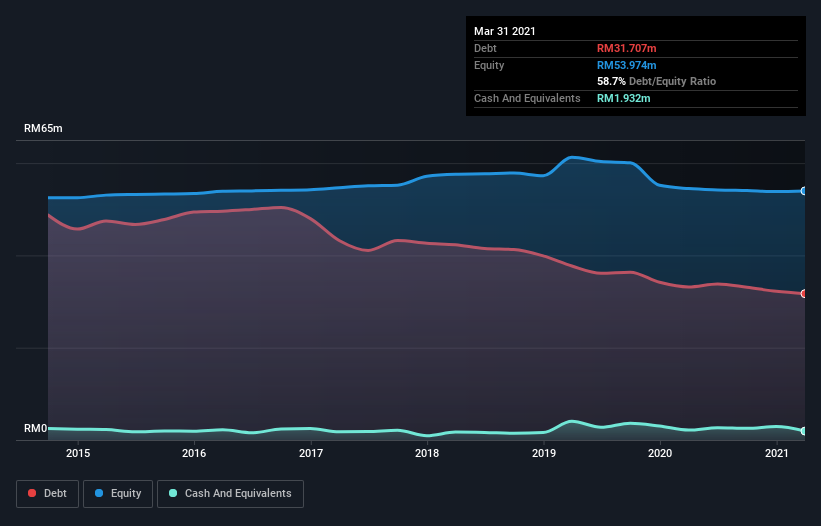- Malaysia
- /
- Basic Materials
- /
- KLSE:DFCITY
DFCITY Group Berhad (KLSE:DFCITY) Is Making Moderate Use Of Debt
Howard Marks put it nicely when he said that, rather than worrying about share price volatility, 'The possibility of permanent loss is the risk I worry about... and every practical investor I know worries about.' So it might be obvious that you need to consider debt, when you think about how risky any given stock is, because too much debt can sink a company. We note that DFCITY Group Berhad (KLSE:DFCITY) does have debt on its balance sheet. But is this debt a concern to shareholders?
When Is Debt Dangerous?
Debt and other liabilities become risky for a business when it cannot easily fulfill those obligations, either with free cash flow or by raising capital at an attractive price. Ultimately, if the company can't fulfill its legal obligations to repay debt, shareholders could walk away with nothing. However, a more frequent (but still costly) occurrence is where a company must issue shares at bargain-basement prices, permanently diluting shareholders, just to shore up its balance sheet. Of course, the upside of debt is that it often represents cheap capital, especially when it replaces dilution in a company with the ability to reinvest at high rates of return. The first step when considering a company's debt levels is to consider its cash and debt together.
Check out our latest analysis for DFCITY Group Berhad
What Is DFCITY Group Berhad's Debt?
The image below, which you can click on for greater detail, shows that DFCITY Group Berhad had debt of RM31.7m at the end of March 2021, a reduction from RM33.1m over a year. However, it does have RM1.93m in cash offsetting this, leading to net debt of about RM29.8m.

A Look At DFCITY Group Berhad's Liabilities
The latest balance sheet data shows that DFCITY Group Berhad had liabilities of RM22.7m due within a year, and liabilities of RM19.2m falling due after that. Offsetting these obligations, it had cash of RM1.93m as well as receivables valued at RM5.92m due within 12 months. So its liabilities total RM34.1m more than the combination of its cash and short-term receivables.
This deficit is considerable relative to its market capitalization of RM43.5m, so it does suggest shareholders should keep an eye on DFCITY Group Berhad's use of debt. Should its lenders demand that it shore up the balance sheet, shareholders would likely face severe dilution. There's no doubt that we learn most about debt from the balance sheet. But you can't view debt in total isolation; since DFCITY Group Berhad will need earnings to service that debt. So if you're keen to discover more about its earnings, it might be worth checking out this graph of its long term earnings trend.
Over 12 months, DFCITY Group Berhad made a loss at the EBIT level, and saw its revenue drop to RM18m, which is a fall of 13%. That's not what we would hope to see.
Caveat Emptor
Not only did DFCITY Group Berhad's revenue slip over the last twelve months, but it also produced negative earnings before interest and tax (EBIT). Indeed, it lost RM1.6m at the EBIT level. When we look at that and recall the liabilities on its balance sheet, relative to cash, it seems unwise to us for the company to have any debt. Quite frankly we think the balance sheet is far from match-fit, although it could be improved with time. For example, we would not want to see a repeat of last year's loss of RM265k. In the meantime, we consider the stock very risky. There's no doubt that we learn most about debt from the balance sheet. However, not all investment risk resides within the balance sheet - far from it. We've identified 3 warning signs with DFCITY Group Berhad (at least 1 which is a bit unpleasant) , and understanding them should be part of your investment process.
If, after all that, you're more interested in a fast growing company with a rock-solid balance sheet, then check out our list of net cash growth stocks without delay.
If you're looking for stocks to buy, use the lowest-cost* platform that is rated #1 Overall by Barron’s, Interactive Brokers. Trade stocks, options, futures, forex, bonds and funds on 135 markets, all from a single integrated account. Promoted
New: Manage All Your Stock Portfolios in One Place
We've created the ultimate portfolio companion for stock investors, and it's free.
• Connect an unlimited number of Portfolios and see your total in one currency
• Be alerted to new Warning Signs or Risks via email or mobile
• Track the Fair Value of your stocks
This article by Simply Wall St is general in nature. We provide commentary based on historical data and analyst forecasts only using an unbiased methodology and our articles are not intended to be financial advice. It does not constitute a recommendation to buy or sell any stock, and does not take account of your objectives, or your financial situation. We aim to bring you long-term focused analysis driven by fundamental data. Note that our analysis may not factor in the latest price-sensitive company announcements or qualitative material. Simply Wall St has no position in any stocks mentioned.
*Interactive Brokers Rated Lowest Cost Broker by StockBrokers.com Annual Online Review 2020
Have feedback on this article? Concerned about the content? Get in touch with us directly. Alternatively, email editorial-team (at) simplywallst.com.
About KLSE:DFCITY
DFCITY Group Berhad
An investment holding company, engages in the manufacture, sales, and installation of dimension stones and related products in Indonesia and Malaysia.
Adequate balance sheet with acceptable track record.
Market Insights
Community Narratives




